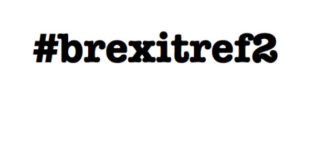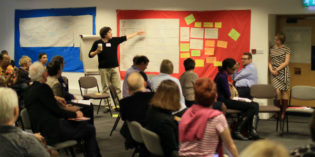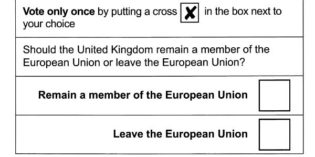EU referendum

Politicians haven’t been honest with the public about immigration. They still aren’t
The populist surge that helped propel Brexit isn’t going to help the UK take control of its borders, writes Tim Bale. Neither Labour nor the Conservatives have been honest with voters about immigration policy, and that shows little signs of changing after a hard Brexit. The gap between rhetoric and reality has given politicians the opportunity to […]

Submarine May can’t slip back under the waves. Keeping Brexit negotiations secret is impossible
The story of Brexit has been that of a would-be secretive government forced to become more open about its intentions, writes Ben Worthy. Pressure from select committees, the media and freedom of information requests – compounded by a stream of leaks – means we now know what kind of Brexit we will have. But he […]

What would voters be asked in a second EU referendum – and would they get it?
If – and it’s a big if – the government were to call a second EU referendum, what question would it ask? And would it be able to deliver the answer? In this extract from a new UCL European Institute working paper, Alan Renwick examines the likelihood, terms and outcome of any ‘second round’ vote. […]

We’re taking back control – but who’s going to wield it?
Britain voted to ‘take back control’ from the EU, and Theresa May’s Lancaster House speech made the repatriation of power to Westminster a priority. But it is far from clear what kind of Brexit Britons want, nor how many of these powers will go to Scotland, Wales and Northern Ireland rather than the UK Parliament. Katie Ghose […]

Britons are applying for Irish citizenship to get an EU passport. Is this a problem?
Since the Brexit vote, many British citizens have sought citizenship in other EU member states – notably Ireland – on the basis of ancestry or other provisions, often without any intention of living there. Should we welcome this development? Or is it problematic that people can claim citizenship on the basis of ancestry, especially if large […]

How ‘the story’ subsumed ‘The Vote’: we have no meaningful direction about the terms of Brexit
What did the 52% who voted to leave the EU want? In the first part of a lecture delivered at the Goethe University in Frankfurt, David Kershaw argues that pro-Brexit politicians and media have presumed to interpret the vote as a mandate to ensure Brexit results in the controls on free movement which are likely to […]

Referendums, informed voting and the trouble with a ‘truth commission’
Following the EU referendum, there have been demands for a ‘truth commission’ to be set up to oversee future referendum campaigns. Paul Kildea argues that there are significant practical difficulties to the establishment of such a body. These include the possibility of a ‘chilling effect’ on speech, the fact that the accuracy of many controversial […]

The ultimate test for anti-Brexit MPs: will they resign their seats?
MPs who feel strongly enough about a particular issue – whether Heathrow expansion, the Anglo-Irish Agreement or increasing pre-trial detention – have sometimes resigned their seats and stood again as independents or for another party. Will anti-Brexit MPs adopt this strategy? Sean Swan says it is fraught with risks, but resigning en masse would be the […]

Thinking harder: how we could do referendums differently
A single vote will take us out of the EU, quite possibly without Parliament’s explicit consent. Davina Cooper asks whether a referendum based purely on individual Leave/Remain votes was the best we can do – or whether a more deliberative system, which would demand more engagement from the public, could produce a more considered outcome. Similar PostsThe case […]

Beyond the binary: what might a multiple-choice EU referendum have looked like?
Voters in the EU referendum could choose only between leaving and remaining – with no say on whether to stay in the single market, renegotiate a different deal or even integrate more fully with the EU. Lily Blake argues a multiple-choice referendum of the kind held occasionally abroad would have been less divisive, set a […]


 Democratic Audit's core funding is provided by the Joseph Rowntree Charitable Trust. Additional funding is provided by the London School of Economics.
Democratic Audit's core funding is provided by the Joseph Rowntree Charitable Trust. Additional funding is provided by the London School of Economics.